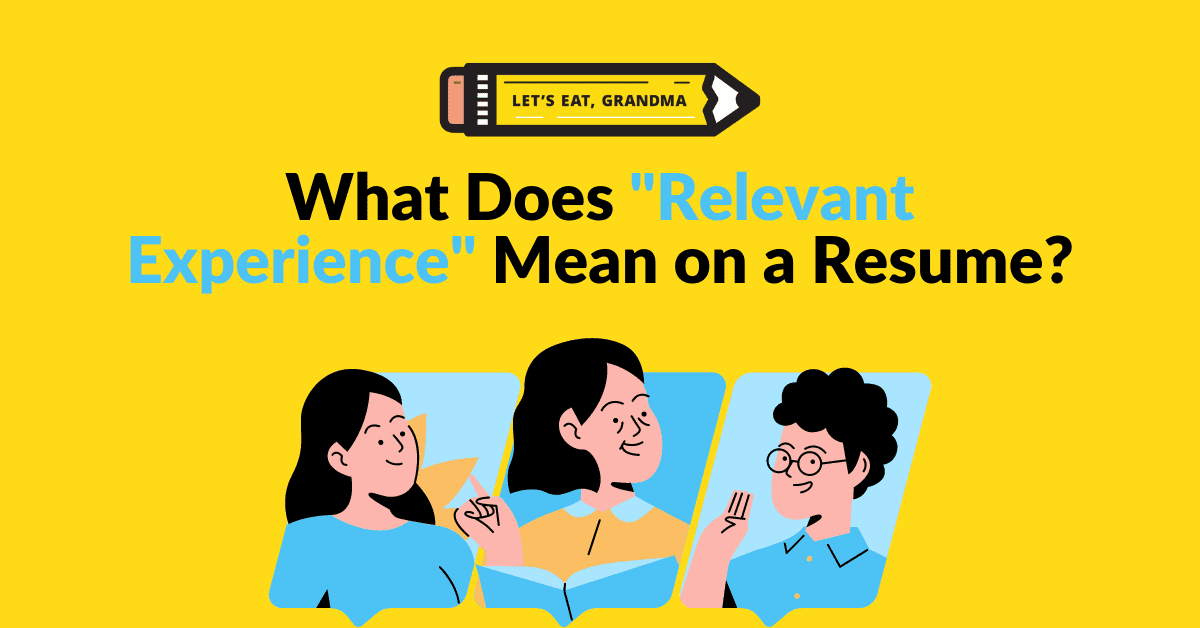This 1 Thing Can Make or Break Your Resume: Relevant Experience

Not sure how to distill a career’s worth of work into 1-2 pages? Here’s how to identify relevant experience for your resume.
By: Katelyn Skye Bennett | Contributor for Let’s Eat, Grandma
Landing a new job requires significant behind-the-scenes work, especially when putting together your resume.
And if there’s one thing that’s true for every successful resume, it’s that they all focus on relevant experience.
Tired of not landing interviews?
Get our free 3-step guide to writing better resume bullet points, featuring 70 ideas for metrics you can use!
What’s So Important About Relevant Experience on a Resume?

A recruiter is going to pass right over your resume if it doesn’t contain relevant information. Photo by Magnet.me on Unsplash
You see, a recruiter who’s reading your resume along with hundreds of others isn’t interested in every detail of your career. They’re concerned only with your experiences and skills that relate to the job that they’re hiring for – which is called your relevant experience.
This means your resume shouldn’t be a book report on your entire career; it should highlight your relevant experience to prove that you can do this job you’re applying for, not just any job.
Although it hurts, you also may have to cut or reword some bullet points or even entire sections. What was a sparkling accomplishment earlier in your career might not be significant to note for the jobs you’re targeting now. However, you have other skills that can take the spotlight now.
This is especially true if you’re changing careers, as your once-stellar resume may now be ill-fit for the new industry, and you have to learn the new lingo as you consider transferable skills. For example, your experience in the service industry might currently populate your resume with the word “customers,” but you can swap it out for the term “clients” if you are now applying to consulting jobs. This simple shift of language will make your resume more relatable to employers in the new industry.
Your resume is nothing if it’s not relevant. Our professional resume writers have some tried-and-true ways to tailor your resume to each job posting, but you’ll still need to know how to identify which parts of your past career experience are relevant to your goals.
Let’s consider what details could be considered relevant experience on your resume or not through a little roleplay.
Determining Relevant Experience for a Resume: An Example to Set the Scene

Even if your background is in a job that is unrelated to the one you’re applying for, you can probably find many aspects of your day-to-day job are still relevant experience for your resume. Photo by Kaleidico on Unsplash
Here’s your story: Let’s say you’re starting a new career in marketing and will be creating content and digital ads. Maybe you just graduated from university or earned an additional degree, or maybe you’ve been working for a couple decades and are now switching careers. Either way, you live in a sunny part of California where serotonin is free, and you are excited for this new change in your life.
However, you are moving from a background in statistical analysis and research to marketing, and you’re not certain how to make that move with your tried and tested, but no longer relevant, resume. So, let’s dig into our recipe for a resume full of relevant experience, section by section.
The secret ingredient is to ask yourself, “Will this detail on my resume matter to the person reading it for this job?” If you’re not sure, remember you can always tell from closely reading the job description.
SUMMARY OF QUALIFICATIONS
In your Summary of Qualifications, you’ll want to note accomplishments that demonstrate your transferable skills. In our example, your experience lies in statistical research and analysis, but now you’ve dropped research and are entering the marketing field.
So while you wouldn’t discuss specific research methodologies in your summary as that wouldn’t be relevant, you can still mention how you effectively disseminated information to diverse audiences and note the forms of media used. Maybe you had an avid following on your research blog and were engaging with readers on a weekly basis – that’s still relevant experience for marketing, even though it wasn’t a marketing job! You can use those numbers, stories, and the content created there in your summary!
What past accomplishments, skills, or awards would be impressive in your new field? Find the overlap and remember how qualified you really are.
PROFESSIONAL EXPERIENCE
Not all of your past jobs will be directly relevant, but you can highlight the experiences that show transferable skills and de-emphasize those that don’t.
To land that content creation job, you can add some bullets on the blogs you crafted, the design or web tools you might have used to present your research, the audiences you reached, or the creative ideas you contributed to your former company. Cut the ones with statistical jargon or analysis methods, as those won’t apply to the new position.
You’ll want your resume to remain consistent and complete, so as you sift what is relevant or not, it’s a good idea to avoid deleting irrelevant jobs entirely, which could give the impression of career gaps . If you worked two jobs simultaneously, delete the one that relates less. You can also remove bullet points from less-relevant jobs or move them to an Additional Experience section, freeing space to bulk up your most relevant resume experience.
SKILLS AND LANGUAGES

Skills in a language other than English are almost always relevant experience to have on your resume. Photo by Kajetan Sumila on Unsplash
In terms of skills, soft skills like interpersonal communication are easily transferable between industries and should likely be considered relevant experience on your resume. Technical skills you’re comfortable with that would be used in your marketing job, like WordPress or Canva, are certainly worth keeping on your resume as well. Again, any soft skill or technology mentioned in the job description is going to be relevant.
Maybe you have new skills you’d like to add! Perhaps external skills like photo editing or video production were previous hobbies of yours or you’ve taken courses on them. In marketing, they are now relevant experience for your resume!
Language skills like Spanish fluency are highly transferable as well, especially if the job is in a highly Latinx area or serves clients that speak your shared language.
Still, remember that not every skill will be relevant, and you shouldn’t let your skill section get too bloated. Your knowledge of SPSS statistical software might have been central within academic research, but it’s not pertinent to the marketing job you are now pursuing, so it will merely take up space on your resume.
EDUCATION AND CERTIFICATES
Any degrees and certifications that taught you skills mentioned in the job description will be relevant experience for your resume. In addition, you should keep your baseline education to show your level of qualifications.
However, certain aspects of your education might not be worth noting if they do not have implications for the job you’re targeting now.
For example, your Certificate in Statistical Analysis, which you gained in addition to your sociology degree, may not be relevant if you are not doing research or consulting anymore. The forklift certificate you gained that year after high school will not help focus your marketing resume either.
Instead, you can use that extra space to bulk up your professional experience section or add additional hard skills in line with your new career.
So, for your new marketing resume, you can keep your bachelor’s in sociology to show your level of education, and add the more recent Coursera certificates you earned in the Adobe Creative Suite. Good job building up those skills for the career switch, by the way! Very smooth.
OTHER RESUME SECTIONS
Additional sections like volunteering, certificates, and languages are optional and always based on what is most relevant. Did you volunteer as a research assistant overseas? Awesome. Does that relate to your ideal office job in California where you’re hoping to design ads that will target local businesses? No. So in this instance, it’s not relevant experience for your resume.
But if you have experience that strengthened the skills you are now using in this new career, it might be worth including. Maybe you managed the social media for that international development nonprofit you volunteered for and were involved in local marketing to raise awareness for their fundraisers. That experience could be worth calling out, whether under the professional experience section or in a separate one below.
Use Critical, Creative Thinking to Decide What’s Relevant Experience for Your Resume
Remember, when deciding what counts as relevant experience for your resume, it all comes down to putting yourself in the employer’s shoes. Does this bullet point from my past experience prove that I can do the job I’m applying for now? What does the job description say?
How do my strengths and experiences translate to this field? How can my background add value to this new industry?
Is the terminology I’m using in line with the industry? How can I phrase my transferable skills or relevant experiences so that employers in this field will see their value quickly?
With your creativity, logic, and wisdom, you’ll be sure to create a resume that stands out in your desired field.
Ready for more job search help?
Sign up for a free Senior Writer Resume Critique to see what's holding you back from landing interviews. One of our top professional resume writers will give you personalized feedback on the top 3 items you can improve based on our expert practices!
